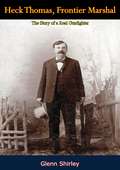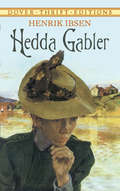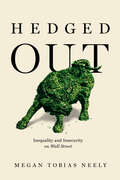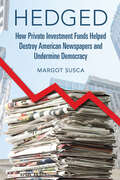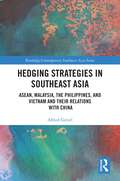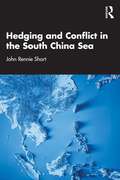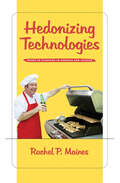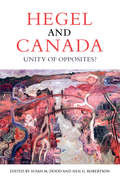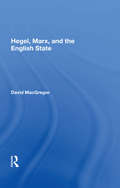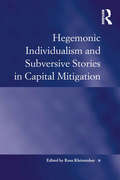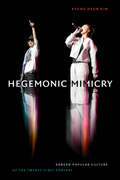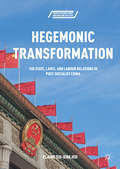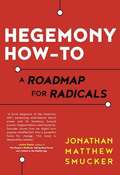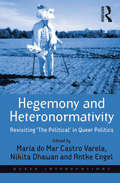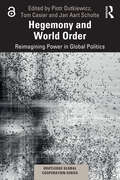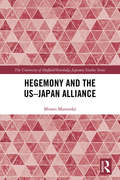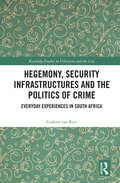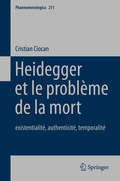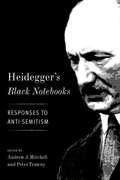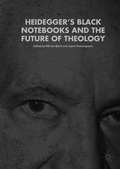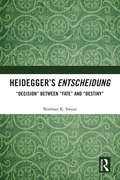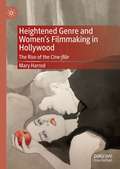- Table View
- List View
Heck Thomas, Frontier Marshal: The Story of a Real Gunfighter
by Glenn ShirleyThe Old West bred some mighty tough men!Unfortunately, the general public knows little or nothing about the good ones!Billy the Kid, the Daltons, Jesse James, Sam Bass, the Youngsters, Wesley Hardin and many more are familiar as “heroes” to the children and their parents of today. So, even more unfortunately are many so-called “lawmen” who were actually nothing but hired killers, far more crooked than most of the men they eliminated!Heck Thomas deserves to be known in a way that most of the current TV “Marshals” never deserved. Fighter, yes, and killer at times, law officer of some of the toughest areas in the Southwest (such as the Cherokee Strip and other outlaw-ridden parts of Oklahoma), he never took a bribe, was a model family man, and lived to a magnificent old age, still “in hardness,” honoured as one of the last genuine heroes of the frontier by all who knew him. No one, outlaw or politician, ever made him back down and his record of arrests and captures still stands as one of the most noteworthy of any peace officer anywhere.To a public which always seeks true heroism and is proud of the iron men who built America, this man, Heck Thomas, must stand forever as the best type of man of the West, low-voiced, courteous, law-abiding, and very, very dangerous.Heck Thomas made his lifework keeping the law, and emerges from the shadowy past to blazing life as an authentic hero of the Old Frontier.
Hedda Gabler
by Henrik IbsenA masterpiece of modern theater, Hedda Gabler is a dark psychological drama whose powerful and reckless heroine has tested the mettle of leading actresses of every generation since its first production in Norway in 1890.Ibsen's Hedda is an aristocratic and spiritually hollow woman, nearly devoid of redeeming virtues. George Bernard Shaw described her as having "no conscience, no conviction ... she remains mean, envious, insolent, cruel, in protest against others' happiness." Her feeling of anger and jealousy toward a former schoolmate and her ruthless manipulation of her husband and an earlier admirer lead her down a destructive path that ends abruptly with her own tragic demise.Presented in this handsome, inexpensive edition, Hedda Gabler offers an unforgettable experience for any lover of great drama or fine literature. Among the most performed and studied of Ibsen's dramas, it continues to provoke and challenge audiences and readers all over the world.
Hedged Out: Inequality and Insecurity on Wall Street
by Megan Tobias NeelyA former hedge fund worker takes an ethnographic approach to Wall Street to expose who wins, who loses, and why inequality endures. Who do you think of when you imagine a hedge fund manager? A greedy fraudster, a visionary entrepreneur, a wolf of Wall Street? These tropes capture the public imagination of a successful hedge fund manager. But behind the designer suits, helicopter commutes, and illicit pursuits are the everyday stories of people who work in the hedge fund industry—many of whom don’t realize they fall within the 1 percent that drives the divide between the richest and the rest. With Hedged Out, sociologist and former hedge fund analyst Megan Tobias Neely gives readers an outsider’s insider perspective on Wall Street and its enduring culture of inequality. Hedged Out dives into the upper echelons of Wall Street, where elite white masculinity is the standard measure for the capacity to manage risk and insecurity. Facing an unpredictable and risky stock market, hedge fund workers protect their interests by working long hours and building tight-knit networks with people who look and behave like them. Using ethnographic vignettes and her own industry experience, Neely showcases the voices of managers and other workers to illustrate how this industry of politically mobilized elites excludes people on the basis of race, class, and gender. Neely shows how this system of elite power and privilege not only sustains itself but builds over time as the beneficiaries concentrate their resources. Hedged Out explains why the hedge fund industry generates extreme wealth, why mostly white men benefit, and why reforming Wall Street will create a more equal society.
Hedged: How Private Investment Funds Helped Destroy American Newspapers and Undermine Democracy (The History of Media and Communication)
by Margot SuscaThe untold history of an American catastrophe The ultrawealthy largely own and guide the newspaper system in the United States. Through entities like hedge funds and private equity firms, this investor class continues to dismantle the one institution meant to give voice to average citizens in a democracy. Margot Susca reveals the little-known history of how private investment took over the newspaper industry. Drawing on a political economy of media, Susca’s analysis uses in-depth interviews and documentary evidence to examine issues surrounding ownership and power. Susca also traces the scorched-earth policies of layoffs, debt, cash-outs, and wholesale newspaper closings left behind by private investors and the effects of the devastation on the future of news and information. Throughout, Susca reveals an industry rocked less by external forces like lost ad revenue and more by ownership and management obsessed with profit and beholden to private fund interests that feel no responsibility toward journalism or the public it is meant to serve.
Hedging Strategies in Southeast Asia: ASEAN, Malaysia, the Philippines, and Vietnam and their Relations with China (Routledge Contemporary Southeast Asia Series)
by Alfred GerstlIntroducing a re-conceptualized hedging framework, this book analyses the relations of the Association of Southeast Asian Nations (ASEAN) and the middle powers Malaysia, the Philippines, and Vietnam with China in the context of the Belt and Road Initiative (BRI). The book provides a brief overview of the development of the relationships between the Southeast Asian states, ASEAN and China since 1989. The author argues that ASEAN and the majority of the Southeast Asian governments pursue a hedging strategy towards the rising China. They seek closer economic relations with Beijing, while maintaining strong security relations with Washington and also try to involve Japan. Hedging expands the strategic options of small and middle powers which are in Neorealism often restricted to bandwagoning and balancing. A hedging strategy, however, can simultaneously contain both elements of bandwagoning (e.g., in economics) and balancing (e.g., in security affairs). By examining the relations of ASEAN, Malaysia, the Philippines, and Vietnam with China and the US and Japan, the book puts forward a new, re-conceptualized hedging concept that combines foreign and security policy with economics. Adding significant new empirical knowledge, the book will be of interest to researchers in the fields of to the field of International Relations, Security Studies, Political Geography, Economics, History and Asian Studies.
Hedging and Conflict in the South China Sea
by John Rennie ShortThe South China Sea is a geopolitical hotspot where China and the US compete for dominance and the adjacent countries try to improve their position by hedging between these two superpowers.This book unpacks the conflicting and competing interpretations of what is going on in the South China Sea. It will allow readers to understand the depth and complexity of the issues. It expands our understanding by looking not only at the competing imaginaries of China and the US but also the hedging strategies of the Association of Southeast Asian Nations (ASEAN) members including Indonesia, Malaysia, Philippines and Vietnam, and the role of the United Nations Convention on the Law of the Sea.This book will appeal to all of those interested in international relations, Southeast Asia, US-China relations and all those seeking to understand conflicts in the South China Sea, one of the world’s geopolitical hotspots.
Hedonizing Technologies: Paths to Pleasure in Hobbies and Leisure
by Rachel P. MainesRachel P. Maines’s latest work examines the rise of hobbies and leisure activities in Western culture from antiquity to the present day. As technologies are "hedonized," consumers find increasing pleasure in the hobbies’ associated tools, methods, and instructional literature.Work once essential to survival and comfort—gardening, hunting, cooking, needlework, home mechanics, and brewing—have gradually evolved into hobbies and recreational activities. As a result, the technologies associated with these pursuits have become less efficient but more appealing to the new class of leisure artisans. Maines interprets the growth and economic significance of hobbies in terms of broad consumer demand for the technologies associated with them. Hedonizing Technologies uses bibliometric and retail census data to show the growth in world markets for hobby craft tools, books, periodicals, and materials from the late 18th century to today. The book addresses basic issues in the history of labor and industry and makes an original contribution to the discussion of how technology and people interact.
Hegel and Canada: Unity of Opposites?
by Susan Dodd Neil G. RobertsonHegel has had a remarkable, yet largely unremarked, role in Canada's intellectual development. In the last half of the twentieth-century, as Canada was coming to define itself in the wake of World War Two, some of Canada’s most thoughtful scholars turned to the work of G.W.F. Hegel for insight. Hegel and Canada is a collection of essays that analyses the real, but under-recognized, role Hegel has played in the intellectual and political development of Canada. The volume focuses on the generation of Canadian scholars who emerged after World War Two: James Doull, Emil Fackenheim, George Grant, Henry S. Harris, and Charles Taylor. These thinkers offer a uniquely Canadian view of Hegel's writings, and, correspondingly, of possible relations between situated community and rational law. Hegel provided a unique intellectual resource for thinking through the complex and opposing aspects that characterize Canada. The volume brings together key scholars from each of these five schools of Canadian Hegel studies and provides a richly nuanced account of the intellectually significant connection of Hegel and Canada.
Hegel, Marx, And The English State
by David MacGregorIn this radically revised intellectual portrait of Hegel and Marx that challenges standard interpretations of their political theory, David MacGregor considers the nature of the state in capitalist society. This is the first book to place Marx’s and Hegel’s political thought directly into social and historical context. Revealing the revolutionary c
Hegemonic Individualism and Subversive Stories in Capital Mitigation
by Ross KleinstuberCapital punishment policies in the USA are almost always justified by an individualistic belief in either rational choice or dispositional attribution, which justifies the death penalty either as a deterrent, or for retributive or incapacitative purposes. This book takes an in-depth look at the mitigation process and the use of individualism in the capital sentencing process. The work examines the use of individualistic (hegemonic) and contextualizing (subversive) discourses in the mitigation cases presented by capital defense attorneys and experts from trials in Delaware, and how these discourses were understood, interpreted, and utilized by jurors who served on those trials and by the judges who imposed the final sentences. This in-depth sociological examination of the use of individualizing and contextualizing accounts throughout the entire mitigation process helps to illuminate the challenges involved in structuring a death penalty that is not arbitrary in a culture that is overwhelmed by individualizing discourses, and thus struggles to account for the entrenched racial and economic inequality that is so conducive to lethal violence. In conclusion, it questions the entire premise of the Supreme Court’s jurisprudence of death, which rests on a belief that the discretion of decision makers can be 'guided' in a way that accounts for contextualizing evidence and will reduce the death penalty’s arbitrary and discriminatory application.
Hegemonic Mimicry: Korean Popular Culture of the Twenty-First Century
by Kyung Hyun KimIn Hegemonic Mimicry, Kyung Hyun Kim considers the recent global success of Korean popular culture—the Korean wave of pop music, cinema, and television, which is also known as hallyu—from a transnational and transcultural perspective. Using the concept of mimicry to think through hallyu's adaptation of American sensibilities and genres, he shows how the commercialization of Korean popular culture has upended the familiar dynamic of major-to-minor cultural influence, enabling hallyu to become a dominant global cultural phenomenon. At the same time, its worldwide popularity has rendered its Koreanness opaque. Kim argues that Korean cultural subjectivity over the past two decades is one steeped in ethnic rather than national identity. Explaining how South Korea leaped over the linguistic and cultural walls surrounding a supposedly “minor” culture to achieve global ascendance, Kim positions K-pop, Korean cinema and television serials, and even electronics as transformative acts of reappropriation that have created a hegemonic global ethnic identity.
Hegemonic Transformation: The State, Laws, and Labour Relations in Post-Socialist China (Series in Asian Labor and Welfare Policies)
by Elaine Sio-ieng HuiThis book contends that the Chinese economic reform inaugurated since 1978 has been a top-down passive revolution, in Gramsci’s term, and that after three decades of reform the role of the Chinese state has been changing from steering the passive revolution through coercive tactics to establishing capitalist hegemony. It illustrates that the labour law system is a crucial vehicle through which the Chinese party-state seeks to secure the working class’s consent to the capitalist class’s ethno-political leadership. The labour law system has exercised a double hegemonic effect with regards to the capital-labour relations and state-labour relations through four major mechanisms. However, these effects have influenced the Chinese migrant workers in an uneven manner. The affirmative workers have granted active consent to the ruling class leadership; the indifferent, ambiguous and critical workers have only rendered passive consent while the radical workers has refused to give any consent at all.
Hegemony How-To: A Roadmap for Radicals
by Jonathan SmuckerA guide to political struggle for a generation that is deeply ambivalent about power. While many activists gravitate toward mere self-expression and identity-affirming rituals at the expense of serious political intervention, Smucker provides an apologia for leadership, organization, and collective power, a moral argument for its cultivation, and a discussion of dilemmas that movements must navigate in order to succeed.
Hegemony and Heteronormativity: Revisiting 'The Political' in Queer Politics (Queer Interventions)
by Nikita Dhawan Antke Engel MarÍa Do Mar Castro VarelaThis book reflects on 'the political' in queer theory and politics by revisiting two of its key categories: hegemony and heteronormativity. It explores the specific insights offered by these categories and the ways in which they augment the analysis of power and domination from a queer perspective, whilst also examining the possibilities for political analysis and strategy-building provided by theories of hegemony and heteronormativity. Moreover, in addressing these issues the book strives to rethink the understanding of the term "queer", so as to avoid narrowing queer politics to a critique of normative heterosexuality and the rigid gender binary. By looking at the interplay between hegemony and heteronormativity, this ground-breaking volume presents new possibilities of reconceptualizing 'the political' from a queer perspective. Investigating the effects of queer politics not only on subjectivities and intimate personal relations, but also on institutions, socio-cultural processes and global politics, this book will be of interest to those working in the fields of critical theory, gender and sexuality, queer theory, postcolonial studies, and feminist political theory.
Hegemony and World Order: Reimagining Power in Global Politics (ISSN)
by Jan Aart Scholte Piotr Dutkiewicz Tom CasierHegemony and World Order explores a key question for our tumultuous times of multiple global crises. Does hegemony – that is, legitimated rule by dominant power – have a role in ordering world politics of the twenty-first century? If so, what form does that hegemony take: does it lie with a leading state or with some other force? How does contemporary world hegemony operate: what tools does it use and what outcomes does it bring?This volume addresses these questions by assembling perspectives from various regions across the world, including Canada, Central Asia, China, Europe, India, Russia and the USA. The contributions in this book span diverse theoretical perspectives from realism to postcolonialism, as well as multiple issue areas such as finance, the Internet, migration and warfare. By exploring the role of non-state actors, transnational networks, and norms, this collection covers various standpoints and moves beyond traditional concepts of state-based hierarches centred on material power. The result is a wealth of novel insights on today's changing dynamics of world politics.Hegemony and World Order is critical reading for policymakers and advanced students of International Relations, Global Governance, Development, and International Political Economy.The Open Access version of this book, available at http://www.taylorfrancis.com, has been made available under a Creative Commons Attribution-Non Commercial-No Derivatives (CC-BY-ND) 4.0 license.
Hegemony and World Order: Reimagining Power in Global Politics (Routledge Global Cooperation Series)
by Jan Aart Scholte Piotr Dutkiewicz Tom CasierHegemony and World Order explores a key question for our tumultuous times of multiple global crises. Does hegemony – that is, legitimated rule by dominant power – have a role in ordering world politics of the twenty-first century? If so, what form does that hegemony take: does it lie with a leading state or with some other force? How does contemporary world hegemony operate: what tools does it use and what outcomes does it bring? This volume addresses these questions by assembling perspectives from various regions across the world, including Canada, Central Asia, China, Europe, India, Russia and the USA. The contributions in this book span diverse theoretical perspectives from realism to postcolonialism, as well as multiple issue areas such as finance, the Internet, migration and warfare. By exploring the role of non-state actors, transnational networks, and norms, this collection covers various standpoints and moves beyond traditional concepts of state-based hierarches centred on material power. The result is a wealth of novel insights on today's changing dynamics of world politics. Hegemony and World Order is critical reading for policymakers and advanced students of International Relations, Global Governance, Development, and International Political Economy.
Hegemony and the US‒Japan Alliance (The University of Sheffield/Routledge Japanese Studies Series)
by Misato MatsuokaIt is widely recognised that the increasing importance of the US‒Japan alliance is strongly linked to emerging threats in the Asia Pacific, with China’s rise and the ambitions of North Korea having brought the two allies closer together. This book, however, seeks to question whether these factors are indeed the sole determinants of this enduring alliance. A pioneering study conducted through the lens of neo-Gramscianism, this book unravels the intricate political dynamism involved in the US‒Japan alliance. It provides an innovative attempt to link the concept of alliances to hegemony and thus examines Japan’s relationship to US dominance in the region. Building on existing scholarship, it also seeks to examine how Japan’s continuing dependence on the US, and the burden it places of citizens living near US military bases, may affect the durability of the alliance in the post-Cold War era. As such, this book presents an alternative theoretical tool in the field of international relations to analyse the political nature of the alliance, as well as US hegemony in the region. This book will be useful to students and scholars of Japanese Politics and foreign policymaking, as well as International Relations and Security Studies more generally.
Hegemony, Security Infrastructures and the Politics of Crime: Everyday Experiences in South Africa (Routledge Studies in Urbanism and the City)
by Gideon van RietThis book examines the politics of crime and the response to it in Potchefstroom, a small settler colonial city in South Africa. It draws on the city’s everyday practices and experiences to offer local bottom-up insights into security beyond the state. The book provides a comprehensive understanding of security beyond the state and how security workers and residents experience and perceive their own security practices, their daily interactions with other security providers which influences power dynamics between those who express fear through various platforms and those deemed potential criminals.. It aids in re-conceptualising violence and security governance in South Africa with a view to analysing the processes of crime prevention and management, the changing nature of public and private spaces and how these spaces interact with state and local authorities. In a rigorous exploration of the ways to tackle the complex problem of crime, the book critiques and overreliance on security infrastructures such as, social media, gated barriers, neighbourhood residents’ associations and private security companies. It also looks at how crime is treated as an individual as opposed to a societal problem. The book addresses the urgent need for collaboration across these fault lines to promote a more inclusive security in a broader fragmented social and political context. With a novel analytical approach based on the twin optics of infrastructure and post-structural hegemony, the book will be relevant to scholars and students of South African politics and critical security studies, as well as international audience interested in crime and private security.
Heidegger Stairwell
by Kayt BurgessWinner of the thirty-fourth annual 3-Day Novel Contest, the infamous literary marathon held every Labor Day weekend. Music journalist Evan Strocker has almost finished a book about his time with Heidegger Stairwell, a legendary indie-rock band. But the band thinks he's left a little too much of himself on the page--letting his experiences as a transgender man and his complicated "romance" with the lead guitarist eclipse the story of the group's dramatic rise and fall. Through notes and marginalia, the musicians argue over their friend's version of the truth and fight to put their own testimony on record. Kayt Burgess has an MA in creative writing from Bath Spa University (UK). This is her first novel.
Heidegger et le problème de la mort
by Cristian CiocanCet ouvrage est la première monographie systématique d'expression française dédiée exclusivement au problème heideggérien de la mort. Il se donne pour tâche de clarifier tout l'enjeu de cette question capitale de la pensée de Martin Heidegger. La nouveauté de cette étude réside dans une approche systématique et précise de Sein und Zeit, à partir d'une clarification rigoureuse de la notion d'Existenzial, en interprétant le problème de la mort dans l'articulation des structures fondamentales de l'être du Dasein Cette approche permet non seulement d'expliciter les différentes couches ontologiques où intervient le phénomène de la mort dans l'analytique existentiale, mais aussi de mettre en lumière la rigueur de l'analyse heideggérienne et la systématicité de sa démarche. En outre, cette investigation explore l'intégralité de la pensée de Heidegger : des écrits de jeunesse jusqu'aux textes les plus tardifs, l'ouvrage retrace non seulement la genèse complexe de cette question, mais aussi son évolution arborescente.
Heidegger's Black Notebooks: Responses to Anti-Semitism
by Peter Trawny Edited by Andrew J. MitchellFrom the 1930s through the 1970s, the philosopher Martin Heidegger kept a running series of private writings, the so-called Black Notebooks. The recent publication of the Black Notebooks volumes from the war years have sparked international controversy. While Heidegger’s engagement with National Socialism was well known, the Black Notebooks showed for the first time that this anti-Semitism was not merely a personal resentment. They contain not just anti-Semitic remarks, they show Heidegger incorporating basic tropes of anti-Semitism into his philosophical thinking. In them, Heidegger tried to assign a philosophical significance to anti-Semitism, with “the Jew” or “world Judaism” cast as antagonist in his project.How, then, are we to engage with a philosophy that, no matter how significant, seems contaminated by anti-Semitism? This book brings together an international group of scholars from a variety of disciplines to discuss the ramifications of the Black Notebooks for philosophy and the humanities at large. Bettina Bergo, Robert Bernasconi, Martin Gessmann, Sander Gilman, Peter E. Gordon, Hans Ulrich Gumbrecht, Michael Marder, Eduardo Mendieta, Richard Polt, Tom Rockmore, Peter Trawny, and Slavoj Žižek discuss issues including anti-Semitism in the Black Notebooks and Heidegger’s thought more broadly, such as German conceptions of Jews and Judaism, Heidegger’s notions of metaphysics, and anti-Semitism’s entanglement with Heidegger’s views on modernity and technology, grappling with material as provocative as it is deplorable. In contrast to both those who seek to exonerate Heidegger and those who simply condemn him, and rather than an all-or-nothing view of Heidegger’s anti-Semitism, they urge careful reading and rereading of his work to turn Heideggerian thought against itself. These measured and thoughtful responses to one of the major scandals in the history of philosophy unflinchingly take up the tangled and contested legacy of Heideggerian thought.
Heidegger, Bonhoeffer and the Concept of Home in Christian Youth Work: A Theological Vision for the Church's Work with Young People
by Phoebe HillThis book explores what it means to be and become-at-home in theological perspective, located in the context of a youth club. Drawing on ethnographic research, Phoebe Hill presents an account of what an authentic Christian hospitality could look like in a youth setting, and the ways in which the young people – the strangers at the door – might enable the Christian youth worker to become more fully at home. Discourses around Christian hospitality often unwittingly perpetuate implicit power imbalances. The youth club offers a context for Christian hospitality that ‘tips’ the power in favour of the young people who attend, enabling the youth leaders to share and create home with young people in a distinctive way. As young people leave the Church in droves, the Church faces the urgent and daunting task of finding new ways of being with young people on their own terms; this book offers one solution. Hill argues that homecoming is an essential task of humanity. We are connected in this common pilgrimage and the need to find places and spaces where we can be at home. Becoming at home may be harder than ever before; numerous sociological, philosophical and theological factors are compromising our ability to dwell in the contemporary world.
Heidegger’s Black Notebooks and the Future of Theology
by Jayne Svenungsson Mårten BjörkThis book probes the relationship between Martin Heidegger and theology in light of the discovery of his Black Notebooks, which reveal that his privately held Antisemitism and anti-Christian sentiments were profoundly intertwined with his philosophical ideas. Heidegger himself was deeply influenced by both Catholic and Protestant theology. This prompts the question as to what extent Christian anti-Jewish motifs shaped Heidegger's own thinking in the first place. A second question concerns modern theology's intellectual indebtedness to Heidegger. In this volume, an array of renowned Heidegger scholars - both philosophers and theologians -investigate Heidegger's animosity toward the biblical legacy in both its Jewish and Christian interpretations, and what it means for the future task and identity of theology.
Heidegger’s Entscheidung: “Decision” Between “Fate” and “Destiny”
by Norman K. SwazoThis book critically examines the debate on Martin Heidegger’s concept of Entscheidung ("decision") and his engagement and confrontation with Nazism in terms of his broader philosophical thought. It argues that one cannot explain Heidegger’s actions without accounting for his idea of "decision" and its connection to his understanding of individual "fate" and national (and European) "destiny." The book looks at the relation of biography to philosophy and the ethical and political implications of appropriating Heidegger’s thinking in these domains of inquiry. It highlights themes such as Heidegger’s differences with the neo-Kantians in Germany; Heidegger on Kant and practical reason; and his reading of Nietzsche and Hegel. It offers a philosophical assessment grounded in Heidegger’s own texts, with reference to historical and other philosophical commentaries on the rise of National Socialism in post-Weimar Germany and the philosophical issues associated with the interpretation of Nazi genocide and ideology. An important intervention in Western philosophy, this book will be of great interest to scholars and researchers of political philosophy, continental philosophy, German philosophy, philosophy in general, and political studies.
Heightened Genre and Women's Filmmaking in Hollywood: The Rise of the Cine-fille
by Mary HarrodDespite the widely publicised prejudice faced by women in Hollywood, since around 1990 a significant minority of female directors have been making commercially and culturally impactful films there across the full range of genres. This book explores movies by filmmakers Amy Heckerling, Nora Ephron, Nancy Meyers, Catherine Hardwicke, Sofia Coppola, Kimberly Peirce, Kathryn Bigelow and Greta Gerwig, including many which are still critically neglected or derided, seeing them as offering a new understanding of genre filmmaking. That is, like many other contemporary films but in a striking proportion within the smaller set of mainstream movies by women, this body of work revels in a heightened genre status that allows its authors to simultaneously address ‘intellectual’ cinephilic pleasures and bodily-emotive ones. Arguing through close analysis that these films demonstrate the inseparability of such strategies of engagement in contemporary genre cinema, Heightened Genre reclaims women’s mainstream filmmaking for feminism through a recalibration of genre theory itself.
